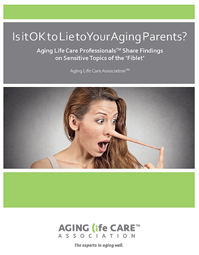
From our earliest days we are taught never to lie, especially never to our mother or father. However, a survey of Aging Life Care™ experts reveals that telling a “fiblet” can actually be therapeutic when adult children are faced with telling painful truths to aging parents with a cognitive impairment such as Alzheimer’s disease.
Aging Life Care Professionals on the Use of “Fiblets”
“Is it okay to lie to my aging parents?” is a common question adult children ask. In a recent white paper released by the Aging Life Care Association™, Aging Life Care Managers discuss this sensitive topic and the use of “fiblets.” The term “fiblet” was coined in by the 2000 World Alzheimer’s Congress as “necessary white lies to redirect loved ones or discourage them from detrimental behavior.”
Over 90 percent of Aging Life Care Professionals™ surveyed say they have used or recommended the strategy to relieve stress and anxiety and protect self-esteem of an elderly person. The situation cited most in the survey by experts as an appropriate and helpful use of a “fiblet” is when a senior is refusing clearly needed care or assistance at their home. For example, telling an aging parent with Alzheimer’s that a paid caregiver is coming to their home for their spouse’s benefit or for another concrete role can help them maintain pride and reduce anxiety.
Aging Life Care Professionals cite this situation as one of the most common and difficult faced by families. Aging Life Care Professionals help families and loved ones deal with some of the most sensitive and challenging issues when helping aging parents. The Aging Life Care Association conducted the survey of its members in April 2014.
The following were most often identified by Aging Life Care Professionals as situations when it can actually be therapeutic to tell a “fiblet” to your aging parent:
1. When they are refusing needed care/assistance at home. Telling them the caregiver is there for their spouse’s benefit or for another concrete role can help them maintain pride and reduce anxiety. (Identified by 83% of those surveyed.)When they can no longer safely drive and insist on doing so. Telling them their car is in the shop getting repaired can reduce confrontations. (68%)
2. When they can no longer safely drive and insist on doing so. Telling them their car is in the shop getting repaired can reduce confrontations. (68%)When knowing the cost of in-home care/help prevents them from accepting the needed service. (68%)
3. When knowing the cost of in-home care/help prevents them from accepting the needed service. (68%)
4. When telling them about family problems that they can’t solve (unemployment, financial upheaval, divorce, drug abuse, incarceration) will only cause worry and stress. (64%)
Americans are increasingly challenged by the need to communicate difficult information to aging family members with dementia. According to the National Institutes of Health, as many as 5 million of the 43 million Americans age 65 and older may have Alzheimer’s disease and another 1.8 million people have some other form of dementia. Among all people with dementia, many are believed to have a mixed type of dementia that can involve more than one of the disorders.

“A therapeutic ‘fiblet’ is just that – it is therapeutic because it calms and reassures, reduces anxiety and protects self-esteem,” says ALCA past-president Emily Saltz, MSW, LICSW, CMC. “You would use a ‘fiblet’ only with parents who have a cognitive impairment such as Alzheimer’s disease,” Ms. Saltz adds.
As part of the survey, Aging Life Care Professionals were asked to provide comments about their experiences in recommending the use of a “fiblet”. A universal theme of the comments was that family members should navigate this clearly delicate area with help from a support group or from an experienced professional. Aging Life Care experts also stressed that one should only use a “fiblet” to protect and support a family member rather than for personal benefit or gain.
The following are among over 200 stories collected through the survey about Aging Life Care Professionals’ experiences using of a “fiblet” in the course of their practices:
“I’ve used therapeutic ‘fiblets’ in many instances but probably (most often) when the death of a loved one is beyond a person’s capacity to understand. For example, if a person is looking for a deceased loved one, I tell them that I haven’t seen that person today but when I do, I’ll tell them that the person is looking for them. This serves to validate their experience and provide reassurance that someone cares.”
“When an adult son was diagnosed with cancer, the decision was made to not inform his frail, memory-impaired nursing home bound father of the diagnosis. At the same time, the son increased his visits to his father during treatment as he had more free time available for visits. The son and father enjoyed more time together without stressing the father with a scary diagnosis.”
“A client wanted to see their mother who had passed away many years ago. Instead of telling her that her mother had died and causing her to grieve “again” we told her she was out and would return later. She accepted that and went on with her day.”
You can download a copy of “Is it OK to Lie to Your Aging Parents?” to share with family members or to discuss with a professional. To find an Aging Life Care Professional near you, visit aginglifecare.org to search for an expert.
This blog is for informational purposes only and does not constitute, nor is it intended to be a substitute for, professional advice, diagnosis, or treatment. Information on this blog does not necessarily reflect official positions of the Aging Life Care Association™ and is provided “as is” without warranty. Always consult with a qualified professional with any particular questions you may have regarding your or a family member’s needs.
Source: ALCA Blog